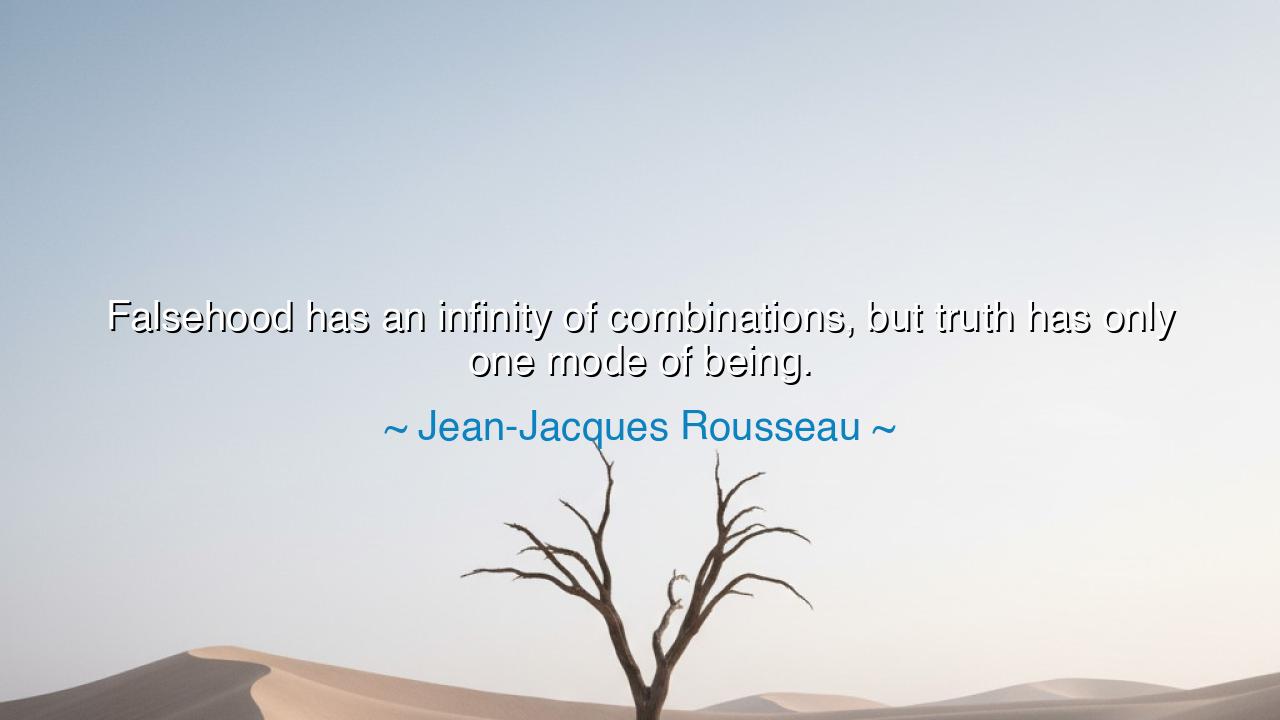
Falsehood has an infinity of combinations, but truth has only






“Falsehood has an infinity of combinations, but truth has only one mode of being.” Thus declared Jean-Jacques Rousseau, the restless voice of the Enlightenment, a man who sought to strip away the masks of civilization and restore the human heart to its natural state. In this saying, he reveals a great paradox of existence: that falsehood, like a hydra with a thousand heads, can twist itself into endless forms, but truth is singular, straight, and unyielding. To know the truth is to behold unity. To walk in falsehood is to wander in infinite confusion.
The ancients too understood this. They taught that the path of truth is narrow, but the roads of deception are countless. The liar, once committed, must weave story upon story, invention upon invention, until he is ensnared in his own web. But the one who stands in truth has no such burden; his words and his deeds align, and reality itself supports him. Rousseau, living in an age of polished lies, of courtiers who cloaked corruption with eloquence, saw with piercing clarity that truth does not multiply—it simply is.
Consider the tale of George Washington at Valley Forge. Surrounded by hunger, frost, and despair, he might have comforted his men with illusions, promising swift victories or abundant supplies that did not exist. Yet he chose instead to speak plainly, to acknowledge the suffering, and to appeal to their honor and endurance. His truth was hard, but it was whole. His soldiers, knowing they were not deceived, clung to him with greater loyalty. Here we see Rousseau’s wisdom: while lies can take a thousand forms to entice, truth has but one, and in its singularity, it becomes strength.
Contrast this with the fall of Napoleon in his later years. At first, his genius for strategy seemed boundless, and his charisma swayed nations. But as he reached too far, he cloaked his ambition with endless falsehoods—promises of peace, assurances of victory, fabrications to justify conquest. Each lie required another to sustain it, until his empire collapsed under the weight of its illusions. The combinations of falsehood may be infinite, but they cannot endure, for they lack the unity of truth.
Rousseau’s words are not only a warning for rulers and generals, but for every soul. In daily life, how easy it is to twist the truth just slightly—to escape blame, to gain praise, to avoid discomfort. Yet each small falsehood demands another, and soon the heart is divided against itself. The one who chooses the harder path of truth, though it may wound at first, walks in freedom thereafter. His words are simple, his conscience at rest, for truth has no variations, no contradictions—it is whole and eternal.
Therefore, children of the future, take this lesson into your hearts: do not be dazzled by the infinite faces of falsehood. They may glitter with cleverness, they may promise ease, but they lead only to confusion and ruin. Seek instead the singular face of truth, which is often plain, sometimes hard, but always steady. For in that one mode of being lies clarity, peace, and strength.
Let your practice be this: when faced with choice, ask not which path is easiest, but which path is true. If your words do not need another word to support them, they are true. If your deeds do not need excuses, they are true. Guard this unity with vigilance, for in a world of infinite deception, to live by truth is to live heroically. And remember Rousseau’s wisdom: falsehood may multiply, but truth is one—unchanging, eternal, and indestructible.






BTBao Tran
Rousseau’s idea of truth as singular and falsehood as infinitely variable brings a sense of clarity. But could this quote be oversimplifying the nature of truth? In reality, truth can be hard to define, especially when perspectives and facts can be interpreted in various ways. Can truth really be one-dimensional, or does it sometimes shift depending on context or individual understanding? How do we find the ‘one mode of being’ truth in such a complex world?
MDDao My Duyen
The idea that falsehoods have endless combinations and truth has only one mode is powerful, but is it too limiting? What if truth has layers or nuances that are context-dependent, while falsehoods try to exploit those layers in various ways? Is the singular nature of truth really enough to navigate the complexities of the modern world? Can truth be a little more flexible without losing its core integrity?
TNTran Tue Nghi
Rousseau’s quote implies that falsehoods are infinite, while truth remains constant. But what happens when different truths collide or seem to contradict each other? For example, what if people believe in different truths based on their personal experiences or cultural backgrounds? Does the existence of multiple perspectives mean that truth is not as singular as Rousseau suggests? How do we reconcile the simplicity of truth with the complexity of human perception?
NHHoang Thi Ngoc Ha
Rousseau’s observation that falsehoods can take on endless forms makes me wonder—if falsehoods are so numerous, does it mean that lies are more adaptable and easier to believe than the truth? Can truth truly be so simple and singular when the world is filled with conflicting opinions and narratives? Is the challenge of finding the truth about a situation more difficult than simply accepting a falsehood because it’s more malleable?
LDNhat Le Dang
The idea that truth has only one mode of being while falsehood is limitless feels almost comforting in its simplicity. It suggests that truth is a constant, no matter how complex the world around us becomes. But is truth always that simple? In a world full of subjective experiences, isn’t it possible that truth can manifest in different ways for different people? Or is Rousseau emphasizing a universal truth that transcends personal perspectives?